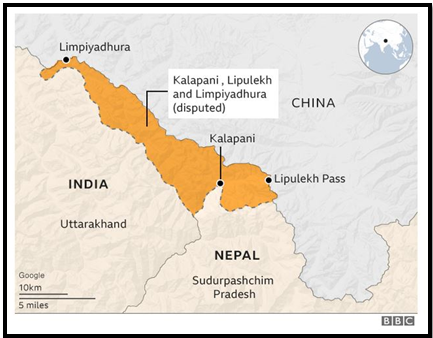“NAVIGATING THE EVOLVING DYNAMICS OF INDIA-NEPAL RELATIONS”
Syllabus:
- GS-2 :Bilateral relation of India with other countries , Neighborhood first policy ,impact of Chinese presence
Focus :
- The focus of the article is on the evolving dynamics of India-Nepal relations amidst Nepal’s political transition, China’s increasing influence, and India’s diplomatic strategy.
- It examines the challenges and opportunities arising from Nepal’s identity crisis, political instability, and regional security concerns, while proposing initiatives for economic cooperation, cultural ties, and diplomatic engagement to foster stability and mutual trust.
Source - BBC
Introduction
- Nepal’s current political and economic landscape characterized by restlessness and uncertainty.
- Questions regarding Nepal’s rushed transition to a secular federal democratic republic.
- Shifts in political alliances and their implications for India-Nepal relations.
Challenegs in India -Nepal relations
- Political Instability: Nepal has experienced frequent changes in government and political instability, leading to uncertainty in bilateral relations with India.
- China’s Growing Influence: China’s increasing presence and influence in Nepal pose challenges for India’s traditional ties with its neighbor, as seen in recent diplomatic and infrastructure initiatives backed by Beijing.
- Identity Crisis: Nepal faces internal debates over its national identity, including questions about its secular status and the role of the monarchy, which can impact its relationship with India.
- Cross-Border Instability: Concerns persist about cross-border activities, including smuggling and potential terrorist activities, which could strain security cooperation and trust between India and Nepal.
- Divergent Foreign Policy Priorities: Differences in foreign policy priorities, especially regarding engagement with China and participation in initiatives like the Belt and Road Initiative (BRI), may lead to tensions and diverging interests between India and Nepal.
- Public Perception and Sentiment: Perception gaps and public sentiment, influenced by historical narratives and geopolitical factors, can shape attitudes towards bilateral relations, affecting trust and cooperation between the two countries.
Political Transition and Identity Crisis
- Debate over the hasty transformation into a secular federal democratic republic.
- Uncertainty regarding the direction of Nepal’s political trajectory.
- Calls for reversion to Hindu identity and restoration of the monarchy amid political instability.
China’s Growing Influence
- China’s proactive involvement in Nepal’s political affairs.
- Renewed alliance between left parties and China’s role in fostering it.
- Implications of Nepal’s engagement with China’s Belt and Road Initiative (BRI) on India-Nepal relations.
Security Concerns and Regional Dynamics
- Historical context of cross-border instigations and terrorist activities.
- Potential ramifications of Nepal’s political instability on regional security.
- India’s strategic response and its implications for regional stability.
India -Nepal Relations:
|
India’s Diplomatic Approach
- India’s policy of non-interference in Nepal’s internal affairs.
- Balancing act between maintaining a low profile and addressing strategic concerns.
- Proposals for offering a holistic development roadmap to Nepal to foster cross-party consensus and stability.
Economic Cooperation and Development Initiatives
- Opportunities for transformative and sustainable development projects in Nepal.
- Potential areas of collaboration in health, education, and infrastructure development.
- Promoting investment and economic interlinkages to address common developmental challenges.
Cultural and Civilizational Ties
- Leveraging shared cultural heritage to strengthen bilateral relations.
- Addressing concerns of equality and sovereignty to enhance mutual trust.
- Importance of diplomatic style and substance in fostering a cooperative relationship.
Conclusion
- Recap of the challenges and opportunities in India-Nepal relations.
- Need for proactive diplomatic engagement to navigate evolving dynamics.
- The role of the new government in New Delhi in shaping the future trajectory of bilateral relations.
Source:The Hindu
Associated article :
https://universalinstitutions.com/india-nepal-relations/
Mains Practice Question :
GS-3
“Discuss the evolving dynamics of India-Nepal relations in the context of Nepal’s political transition, China’s growing influence, and India’s diplomatic approach. Analyze the challenges and opportunities for fostering stability and cooperation between the two countries.” (250 words)




